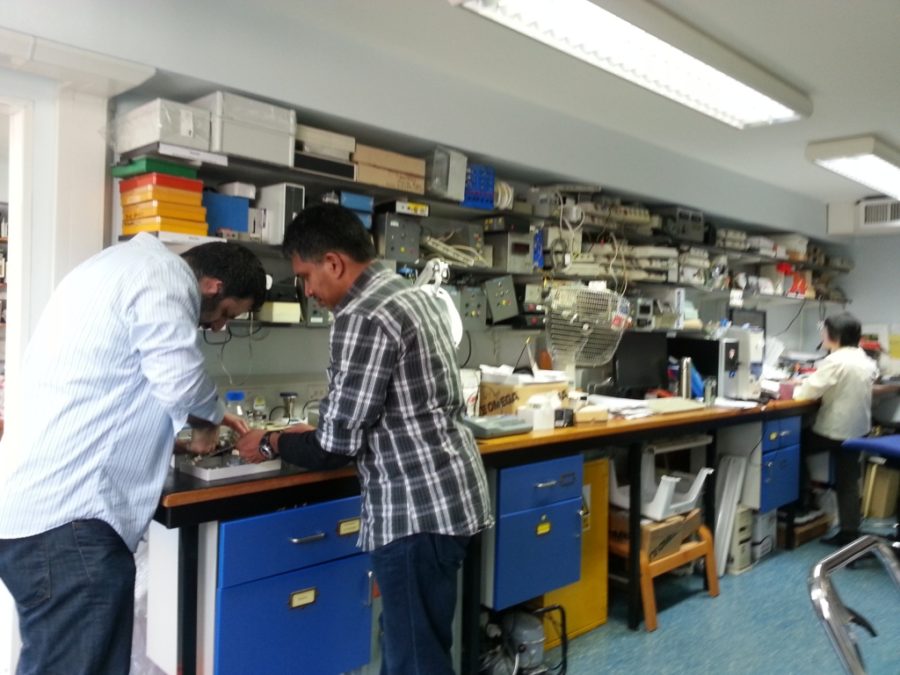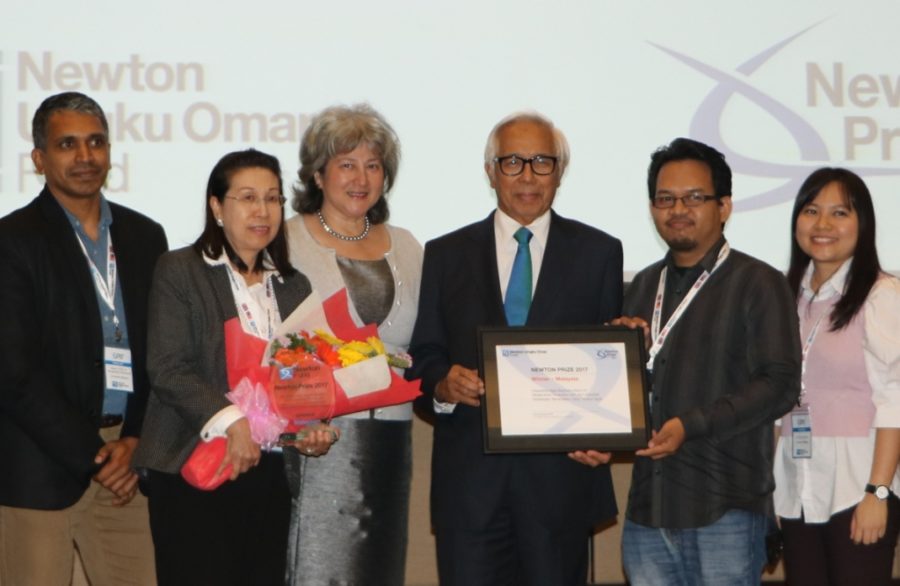8th January 2018
Sustainable Energy from Waste Effluents – a blog by the winner of the Newton Prize Malaysia

This blog is co-authored by Professor Dr. Phang Siew Moi from University of Malaya and Dr. Adrian Fisher from University of Cambridge.
Dr. Kamran Yunus and Dr. P. Vengadesh, setting up the Algae Biophotovoltaic Device at the Centre for Research in Electrochemical Science and Technology, Department of Chemical Engineering and Biotechnology, University of Cambridge, UK.
The winner of the Newton Prize Malaysia 2017 is the project “Integrating Algal Biophotovoltaics for Bioelectricity Production with Agro-industrial Wastewater Remediation Using Tropical Algae”. This project is led by Professor Dr. Phang Siew Moi from University of Malaya and Dr. Adrian Fisher from University of Cambridge.
Global populations rely heavily on fossil fuel which is at risk of depletion within 100 years at the current rate of consumption. Use of fossil fuel for energy is seen as the main contributor of carbon emission leading to climate change. Biophotovoltaic (BPV) platforms based on photosynthesis are an emerging technology. In photosynthesis, a very small amount of solar energy absorbed is transformed into chemical energy, while the rest is wasted as heat and fluorescence. This excess energy can be harvested through BPV platforms to generate electrical energy.
Algae are amongst the most efficient photosynthetic organisms. They are amenable to growth on a wide range of substrates, and have high tolerance for pollutants and toxic compounds, and even environmental factors like temperature and irradiance. During photosynthesis, algae consume carbon dioxide and release oxygen, while producing biomass. Compared to other technologies for carbon sequestration, algae offers economical, sustainable and environment-friendly carbon reducing systems.
In our studies, we have isolated several algal strains that are photosynthetically efficient and grow well in dilute palm oil mill effluent (POME), converting nutrients (C, N) from wastewater into useful algal biomass that can serve as feedstock for production of biodiesel, proteins and other valuable biochemicals.
The supply of energy, specifically electricity, is limited in rural areas in Malaysia. The need to develop sustainable technology platforms for production of bioenergy and biofuel, and bioremediation of waste effluents, is an essential strategy for developing economies of Malaysia. Our project not only provides a carbon neutral source of fuel and energy, but also addresses the needs of low income workforce in plantations and processing industries, such as palm oil and rubber estates.
The Newton-Ungku Omar Fund facilitated the collaborative efforts of existing expertise between Cambridge University and the University of Malaya, to develop an integrated approach for renewable energy and algal biomass technologies, integrating sustainable bioremediation of wastewaters. The prototype Algal Fuel Cell developed at Cambridge University evolved into an Integrated Microbial Fuel Cell – photobioreactor prototype that combines the merits of a photobioreactor for the cultivation of algae and remediation of a wastewater like palm oil mill effluent (POME), and production of power from the algal fuel cell.
Tropical countries rely heavily on agricultural and agro-industrial activities for revenue. The palm oil industry is a major source of income, but is also one of the largest sources of highly polluting waste effluents.
We have shown that tropical microalgae can grow well in dilute POME, remove carbon dioxide through photosynthesis and growth, and simultaneously generate bioelectricity. This unique device represents a green sustainable solution that integrates renewable energy technology, carbon sequestration and waste remediation. This project presents a blueprint for a platform that aims to meet the demands for sustainable energy in rural areas in Malaysia.

The Newton-Ungku Omar Fund fostered the integration of biologists, and biophysicists of the University of Malaya, with the electro-chemists of Cambridge University to produce a sustainable energy device based on photosynthesis of living algal cells. The success of the project is attributed to the sharing of knowledge and belief in the idea. The research also contributed to capacity building in the form of one doctorate and three Master’s graduates. The experience of working together has served as an excellent learning ground.
With the awarding of the Newton Prize, our goal is to develop an operational prototype Integrated Fuel Cell-Photobioreactor (IFCB) that represents a green technology for production of bioelectricity while contributing to a cleaner environment. The IFCB will have improved biocompatibility between the algae and the device, and will be scaled-up for the joint studies between University of Malaya and University of Cambridge. This IFCB can potentially be used in palm oil and other industries that generate organic waste effluents, especially in the tropical regions. With this new grant, there’s no stopping us. The sky’s the limit.